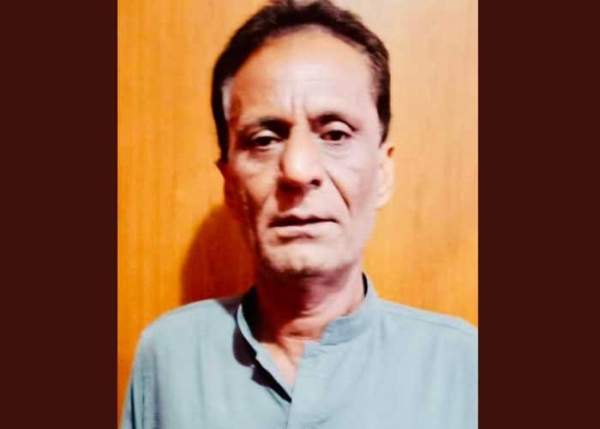
A Hindu school principal has been sentenced to 25 years imprisonment on charges of blasphemy leveled by a class 11 student in Ghotki, Sindh province, two years ago, sources said.
According to All Pakistan Hindu Panchayat (APHP), a sessions court presided by Additional Sessions Judge Mumtaz Ali Solangi convicted Notan Lal under Section 295-C of the blasphemy statutes and Section 265-H of the Code of Criminal Procedure.
Section 295-C calls for the death penalty for derogatory remarks about Prophet Muhammad (PBUH), while Section 265-H states: “If the accused admits that he has been previously convicted as alleged in the charge, the court may pass a sentence upon him according to law, and if the accused does not admit that he has been previously convicted as alleged in the charge, the court may take evidence in respect of the alleged previous conviction, and shall record a finding thereon, and then pass sentence upon him according to law.”
The case against Lal was registered after a student Muhammad Ihtesham accused him of making blasphemous remarks against Prophet Muhammad (PBUH) in 2019.
Ihtesham’s father Abdul Aziz Rajput lodged a complaint against Notan, accusing him of making blasphemous remarks during an Islamiyat class. As the news of a Hindu allegedly using blasphemous language spread, riots broke out in the Ghotki district resulting in looting and plundering of shops owned by the minority Hindu community. The violent mob also ransacked Notan Lal’s Sindh Public School and attacked a Hindu temple, badly damaging its interior.
READ MORE: ‘Mentally ill’ blasphemy convict set free after 10 years
“In the temple, they broke the windows, and the things inside, including our idols, were also damaged,” Mukhi Kika Ram, the leader of the local Hindu community, had told Al Jazeera in an interview after the incident.
According to reports, Muhammad Ihtesham had later revealed in a social media post that he was angry with Notan Lal for scolding him for not learning a lesson. He claimed that he had no clue that the issue would blow up to such a proportion. He urged “Sir Notan” for forgiveness in the social media post.
APHP President Ravi Dawani said that Notan’s family had decided to challenge the session court’s verdict in the Sindh High Court. He said that the members of the civil society called a meeting and took out a ‘Peace Zindabad’ rally to express solidarity with the Hindu community.
READ MORE: Woman sexually assaulted, falsely accused of blasphemy wins acquittal in Lahore
The APHP has also urged Chief Justice of Pakistan Umar Ata Bandial to reinvestigate the case.
MISUSE OF BLASPHEMY ALLEGATIONS
A new research has claimed that at least 89 persons were killed in 1,415 accusations and cases of blasphemy since modern Pakistan was formed in 1947.
The Centre for Research and Security Studies (CRSS) in a report stated that from 1947 to 2021, 18 women and 71 men were extra-judicially killed over blasphemy accusations. The allegations were made against 107 women and 1,308 men. Out of the total, 1,287 persons were accused of committing blasphemy from 2011- 21.
“The actual number is believed to be higher because not all blasphemy cases get reported in the press,” the report said, adding that more than 70 percent of the accused were reported from Punjab. The data showed that 55 cases were filed in the Islamabad Capital Territory, which was more than the cases of blasphemy in Khyber Pakhtunkhwa and Azad Kashmir put together.
READ MORE: Misuse of blasphemy law to be curbed, govt assures church leaders
Moreover, 1,098 cases were reported from Punjab followed by 177 from Sindh, 33 from Khyber Pakhtunkhwa, 12 from Balochistan, and 11 from Azad Jammu and Kashmir (AJK).
For decades, minority leaders have raised concerns about the misuse of blasphemy laws, which stipulate the death sentence for insulting Islam or the Prophet Muhammad (PBUH).
According to Lahore-based Center for Social Justice, “Around 70% of the reported cases under the blasphemy laws during 2021 had taken place in Punjab, where some incidents of false allegation involved students and teachers.”
In January, a sessions court in Rawalpindi handed the death penalty to 26-year-old Aneeqa Ateeq, a Muslim charged with blasphemy for sharing images deemed to be insulting to Prophet Muhammad (PBUH) and one of his wives.
READ MORE: ‘Save Aneeqa’ or ‘Hang Aneeqa’? Pakistanis divided on death sentence for 26yo blasphemy convict
The CRSS report said the misuse of blasphemy laws is often described by courts as an unlawful act. It said the Islamabad High Court had previously suggested to the legislature to amend the existing laws to give equal punishment to those who level false blasphemy accusations.
The debate on Pakistan’s blasphemy laws and their socio-political consequences ranges from the argument “people disrespecting Islam should be punished” to “people are falsely accused to settle personal scores”. One segment of society demands review of the blasphemy laws to prevent and discourage its abuse.
READ MORE: LHC acquits blasphemy convict after 11 years
At the same time, almost always, hardliners argue that the persons having committed an unpardonable religious crime are ‘wajibul qatal’, a term that loosely translates to “worthy of being killed”.
The report takes a look at blasphemy-related violence as reported in secondary sources such as newspapers and tallies the victims, perpetrators, role of law enforcement and number of charges. The state argues that those who commit murder in the name of blasphemy are summarily arrested, indicted and prosecuted.
The report said the origin of the blasphemy laws dated back to the British era when these were promulgated in 1860.
Initially, four blasphemy laws — Section 295, 296, 297, and 298 of Indian Penal Code (IPC) — were introduced and in 1927, Section 295 was supplemented by 295-A after the case of Ilmuddin, a Muslim carpenter, who killed Mahashe Rajpal for publishing a blasphemous book.